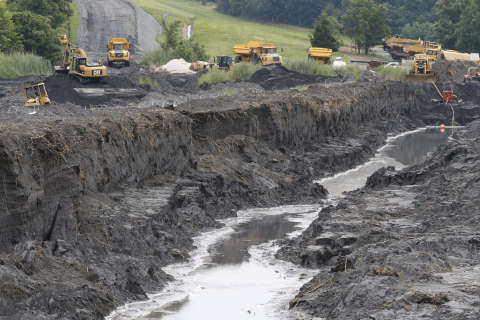WASHINGTON — A bill working its way through the Virginia General Assembly could hit the pause button on Dominion Virginia’s plan to store millions of tons of coal ash in an underground pond at a plant in Dumfries.
State lawmakers are set to vote on changes to the bill recommended by Gov. Terry McAuliffe when they reconvene for a one-day session on Wednesday. They will also take up bills that the governor has vetoed.
The governor’s recommendations would put a yearlong ban on the closing of coal ash ponds in the state by power companies.
McAuliffe’s amendments to the bill would require power companies to study other methods for closing the coal ash ponds such as recycling the coal ash — a waste product created from power plants burning coal — or even moving it to a landfill that is specifically built for coal ash. But lawmakers would have allowed the ponds to close even before such studies were completed.
Lawmakers in Prince William County have been battling with Dominion Virginia Power over the disposal of tons of the toxic waste at Dominion’s Possum Point Power Station in Dumfries. The power station stopped burning coal in 2003.
“This is an extremely important environmental matter and the Board of County Supervisors has advocated for over a year that we need additional information in order to determine what the best choice is with regard to the forever storage of this coal ash,” said Prince William Supervisor Frank Principi (Woodbridge District).
He said right now the 4 million tons of coal ash sit in holes in the ground at the power station.
“We don’t know today whether or not any of those ponds have caused any groundwater contamination. We don’t have those facts yet.”
He worries the toxins will leech into the groundwater, which could threaten the health of residents near the power plant who get their drinking water from wells, not public water systems.
“The concern is that the coal ash has carcinogens in them,” he said.
Dominion has applied for an environmental permit to move all 4 million tons of coal ash into one pond that has a clay or dirt liner and then put a cap on that pond. It is called “cap in place.”
“They simply want to put a cover on it and let it sit on the banks of the river for the next 100 years.”
But Principi worries about a catastrophic event such as a hurricane or a flood uncover the ash and threaten the nearby Potomac River.
Principi said if the bill passes, then Dominion would have to analyze the three types of storage or disposal options for the coal ash. The three methods are to cap and store the ash on site, recycle the coal ash or transport the waste to a landfill.
He said if the disposal is done properly that there would not be any environmental concerns. “If done the wrong way, they might be making a movie out of this someday,” he said.
Robert Richardson with Dominion said that the EPA standards are strict and that the Virginia Department of Environmental Quality standards are even more stringent.
“We believe the existing regulatory model is appropriate. More importantly, it’s a process that is safe and protective of the environment and human health,” Richardson said.
In a statement, McAulife said the proposed changes to the bill are intended to provide the public with more information about the benefits and risks associated with the various options for the coal ash before a final decision on a permit would be reached.





